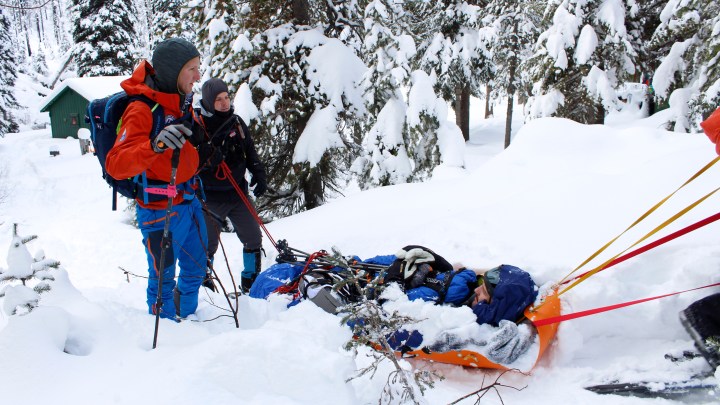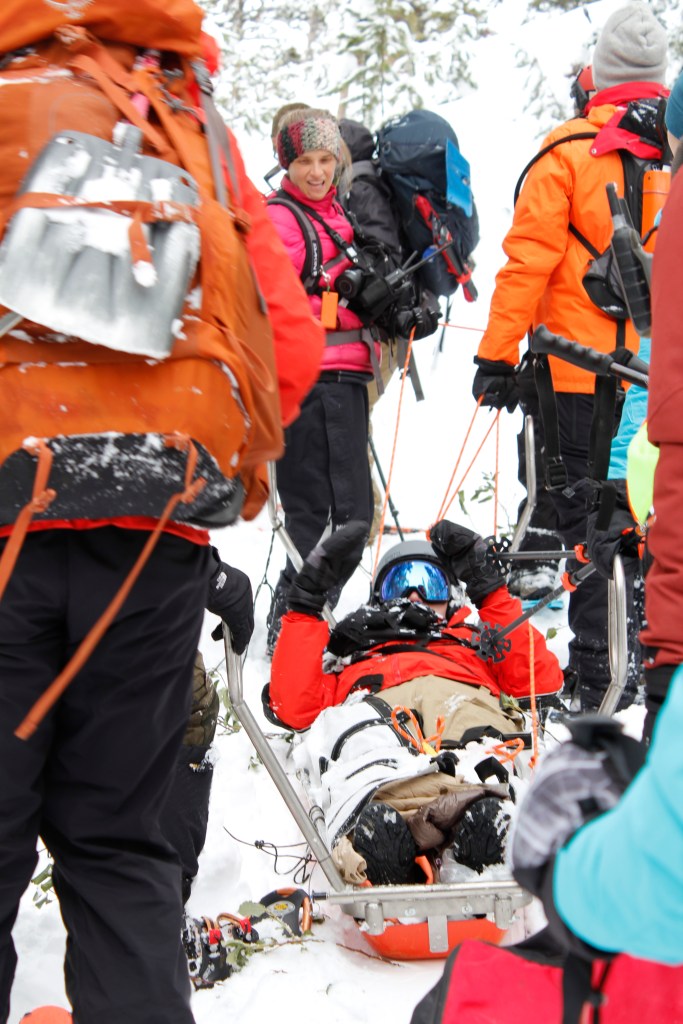
As more people seek recreation outdoors, backcountry rescues are on the rise
As more people seek recreation outdoors, backcountry rescues are on the rise

About 30 volunteers gathered on a recent weekend at a snowy highway turnoff in western Idaho. They were there for a training exercise, and the day’s fictional scenario involved four snowshoers who didn’t come back when they were supposed to.
“We have four overdue subjects. Not entirely sure at the moment how long they’ve been overdue, but we will be finding that out from our law enforcement representative,” said Scotty Perkins, a public information officer and volunteer with the Idaho Mountain Search and Rescue Unit.
So volunteers split into teams, checked their avalanche beacons and skied or snowshoed into the woods.
In just a few hours, groups started to locate missing snowshoers. Over the radio, one of the teams called in: “We’re on scene with a patient, adult male, name of Hunter, age 25. Chief complaint is he is tired.”
Some snowshoers were OK, but others in this made-up situation were not. As more calls came in over the radio, Perkins recognized key phrases.
“As part of our mission, we have some code words associated with the encountering of a deceased subject, and that’s what we just heard,” he said.
The Idaho rescue group had 39 calls for aid last year, up from 29 the year before. Part of the increase came from the weather: cold snaps, but also hot summer days. A group of mountain bikers needed help when temperatures rose faster — and higher — than they expected.
“It’s happened to many of us, and one of the members of that four-person mountain bike team … just found herself in a heat emergency,” Perkins said.
Not every rescue team in the region had more calls over the last 12 months. The Albuquerque Mountain Rescue Council in New Mexico said it received fewer calls, possibly because local responders took on more themselves.
But many others did see increases, due in part to a bad avalanche season early in the year. That’s according to the Mountain Rescue Association, which works with volunteer teams across the nation.
Doug McCall, the association’s president and a volunteer, said more people are also seeking training to help with rescues.
“We saw a huge rise in the number of people registering in our Education Basecamp, either because they were looking for online training or they were looking to get trained before they went into the backcountry,” he said.
Rescue group volunteers often bring their own equipment to emergency calls and training. Other costs for things like websites, emergency gear and vehicles tend to be covered by donations, community fundraisers and grant funding.

Teton County Search and Rescue in Wyoming had more than 100 calls in 2021, compared to 80 the year before. But volunteer Cody Lockhart said that number doesn’t reflect how many people are getting out there.
“There’s a lot more people using the backcountry, and it’s not proportionately translating into more rescues,” he said.
Lockhart said that may be because novices don’t often take as many risks, cell service is better than ever and so many people are there that it’s easier to find help.
But mental health has become a major issue.
“That was defining for us this summer as being part of these big rescues or searches for people that were despondent or struggling,” Lockhart said.
All of this means that volunteers need to be trained for a variety of things they may encounter as more people explore the wilderness.
Chris Brookman, an eight-year volunteer with the Idaho search and rescue group, directed the training off that snowy highway. He underscored the importance of education.
“We come out and we make our team better, and we’re better equipped to go out and prepare folks to help people, as well as we all just enjoy doing this. We like to play in the snow too,” he said.
After the training, a few of the volunteers planned to head out and go backcountry skiing themselves.
There’s a lot happening in the world. Through it all, Marketplace is here for you.
You rely on Marketplace to break down the world’s events and tell you how it affects you in a fact-based, approachable way. We rely on your financial support to keep making that possible.
Your donation today powers the independent journalism that you rely on. For just $5/month, you can help sustain Marketplace so we can keep reporting on the things that matter to you.

















